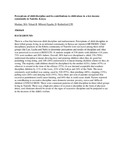| dc.description.abstract | BACKGROUND:
There is a fine line between child discipline and maltreatment. Perceptions of child discipline in three tribal groups living in an informal community in Kenya are reported.METHODS: Child disciplinary practices in the Kibera community of Nairobi were surveyed among three tribal groups (the Luo, Luyha and Nubi) to determine perceptions and modes of discipline and what was perceived as excessive.RESULTS: A random sample of 538 adults with children <18 years; 73% were mothers and 20% fathers. Overall, 98% had ever disciplined a child; 376 (70%) understood discipline to mean showing love and praising children when they do good but punishing wrong-doing, and 108 (20%) understood it to mean beating children whenever they do wrong. The majority said children should be disciplined by the mother (62%), father (47%) or whoever is around at the time of the offence (57%). It was deemed acceptable that teachers discipline children by 11% of the Luos, 23% of the Luhya and 34% of the Nubi. The most commonly used method was caning, used by 520 (97%), then pinching (40%), slapping (33%), pulling ears (20%) and denying food (19%). Sixty-three per cent of parents recognized that excessive punishment could cause fainting, and 64% that it could cause death. Factors reported as contributing to excessive discipline were domestic tension, poverty, stress and 'difficult children'. CONCLUSION: There were consistent patterns of child discipline in three tribal groups living in Nairobi. There was a high prevalence of excessive discipline in the form of physical abuse, and clinicians should be aware of the signs of excessive discipline and be prepared to act in the interests of the child's welfare. | en |

